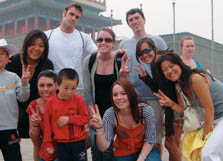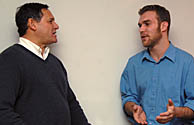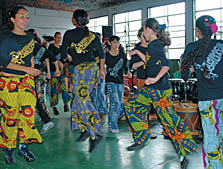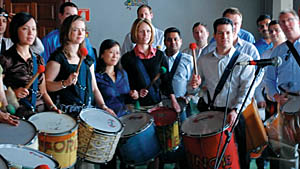
 
Nicole Fencel (top: front row, right; bottom: right) learned firsthand the role of Asia's emerging economies after spending her spring semester studying abroad in Shanghai. |
Stern Junior Hears the Roar of the Chinese Dragon
Nicole Fencel (BS '10) had listened long enough to news of China's explosive expansion. She was more than ready to experience it herself. "Every day we hear in the classroom and the media about China's rapidly growing economy and the possibility it could overtake the US as the world's foremost economic power. I knew I would be remiss if I didn't seize the opportunity to explore Chinese culture firsthand and understand how its growth affects America," explained the Stern junior, who spent last spring studying abroad in Shanghai, China's largest city and most important financial center. A finance and international business major, Fencel is among the growing number of Stern students seeking Asian experience.
"As China and India become increasingly critical markets in the world economy, business students are expressing greater interest in being exposed to these countries as a way to understand the interplay of forces moving them forward," explained Carmen Johnson, head of international programs at Stern's Undergraduate College. The number of Stern students who studied at NYU's Shanghai campus last spring jumped to nearly fifty, compared with just three when the site launched in 2006. "Thirty-six percent of all Stern students who went abroad to an NYU campus in spring 2008 went to Shanghai, versus 11 percent in spring 2007," Johnson added.
In response, Stern is developing new programs in Asia as well as leveraging existing relationships. Recent initiatives include the Indian Leadership Exchange Program, launching in 2009, and a new IBEX (International Business Exchange) partner school in Beijing. Shanghai, where Fencel studied, is an integral site in NYU's network of global campuses and an increasingly popular option with Stern students. "I was able to concentrate on my business studies, but approach topics from a different angle," said Fencel. "My professors there honed in on the Chinese perspective to really deepen our understanding of the culture." This included weekly guest lecturers as well as visits to Chinese companies. Some students gained hands-on experience with internships.
Fencel also participated in NYU's social and cultural offerings in China. Her fondest memory is of a day spent racing dragon boats and barbequing with local university students. "Bonding with the students and hearing their perspective on America really changed my worldview and opened my eyes to the vast cultural differences between us," she said.
Since her return, Fencel has decided to minor in East Asian studies and hopes to one day work overseas, particularly in China. "Earning experience there and gaining knowledge of international business customs will definitely give me an edge with prospective employers, especially those abroad," she said. "My time in Shanghai was an unforgettable, once-in-a-lifetime experience that took me out of my comfort zone and has helped me understand the role of Asia's emerging economies in the global marketplace." |

Samuel Baumel (right) was a student in a new course that partners with Tribeca Film Festival executives such as co-founder Craig Hatkoff (left). |
Undergraduates Advise Tribeca Film Festival Execs on the Digital Revolution
Lights... camera... digital convergence? That's the new "action" for Stern Undergraduate College students, 25 of whom were selected for enrollment in a new partnership course, Convergence and Cinema at the Tribeca Film Festival, that was launched last spring with the Tribeca Film Festival. From February through May, students studied the impact on filmmaking of such multimedia as mobile platforms and new distribution channels.
"We grew up with new media — Facebook, texting, watching videos on our phone," said Samuel Baumel (BS '09), a Stern senior and co-president of the Stern Tisch Entertainment Business Association. "This is our native language. For everyone older than us, it's a second language they need to learn."
Gaining access to native new-media linguists was of particular interest to Festival management. "While film festivals are known as the discovery zone for emerging new filmmakers, we are thrilled to be scouting for a different kind of talent: business students," said Craig Hatkoff, Festival co-founder. "We are eager to hear their advice and ideas on the changing media industry landscape and how those changes may affect our Festival."
 In the course, students were divided into five groups, each one dedicated to a particular aspect of new media, including mobile platforms, the digital revolution, the cable industry, the independent film sector, and the Internet. As the course capstone, each team researched and presented recommendations to Festival management on how best to leverage the digital revolution.
In the course, students were divided into five groups, each one dedicated to a particular aspect of new media, including mobile platforms, the digital revolution, the cable industry, the independent film sector, and the Internet. As the course capstone, each team researched and presented recommendations to Festival management on how best to leverage the digital revolution.
"We're teaching students about the business side of filmmaking, how to repurpose content, generate new revenue streams, and reach new markets," said Al Lieberman, executive director of Stern's Entertainment, Media, and Technology program, who plays a dual role as the visionary behind the course and its professor.
Baumel and his team advised adding a social networking platform to enable film enthusiasts and filmmakers to engage with one another and personalize connections based on genre preferences. "A social networking function would allow Tribeca to really target its marketing efforts at the niches that drive tastes," said Baumel in a New York Sun feature story on the new course.
What's in store for the future? Reflected Baumel: "The digital landscape is still largely unregulated and unsaturated. It's like the Wild West, and there's a gold rush ahead."
 
(Right) Executive MBA students played drums and danced with the Meninos do Morumbi Band (left) during their spring Global Study Tour to Argentina and Brazil. |
Stepping Off Campus to a Latin Beat
This spring, first-year NYU Stern Executive MBA (EMBA) students stepped off campus and into South America to expand their global business acumen and cultural well-roundedness.
Students traveled to Argentina and Brazil as part of a Global Study Tour (GST) course taught by Anat Lechner, clinical associate professor of management and organizations. GST courses, reflecting the curriculum's global perspective on business, are required for each of the students' two years of EMBA study. The course culminates in a one-week trip abroad during which students participate in meetings with leaders of industry, financial institutions, and government organizations. Past GSTs have traveled to Chile, China, India, Russia, and Turkey, among others.
Over the course of the week, students visited BOVESPA, the São Paulo Stock Exchange — the only stock trading center in Brazil and Latin America's largest stock exchange — and discussed the exchange's transformation into an electronic marketplace. They also met with leaders from The Votorantim Group, one of the largest private industrial conglomerates from Latin America, and from Tenaris, a global tube supplier for the energy industry, to learn about the latest in biofuels. Additionally, students spoke with representatives of the Central Bank of Argentina about the socioeconomic issues facing South America.
After studying Brazil and Argentina's economic, political, and social characteristics in class, many of the students found visiting the countries and speaking with the movers and shakers an eye-opening experience. First-year EMBA student and stem-cell biologist Dr. Raj Chadalavada (MBA '09) explained: "We talk about inflation every day in America and how it's topping out at 5 percent, but then you go to Buenos Aires, where they're facing 25 percent inflation, and it really puts your life into perspective. The Argentine people do not seem to plan for anything happening more than two years out. They just do not trust the future of their economy or believe that they'll still have jobs."
Reflecting on the most striking cultural difference he noticed in South America, first-year EMBA student and entrepreneur David Fiore (MBA '09) pointed to the prevalence of poverty in São Paulo. "It was a sobering experience to see so much poverty on our way in from the airport. We saw so many people struggling," he said. "Even though São Paulo is one of the largest cities in the world with 20 million people living in the metropolitan area, the average American knows little about it."
A highlight — and a more uplifting moment — was meeting the Meninos do Morumbi Band, said both Chadalavada and Fiore. Meninos do Morumbi is an after-school program for nearly 5,000 children from poverty-stricken areas of São Paolo that introduces kids to music, dance, sports, and education as a way to keep them off the streets. "Part of getting a well-rounded experience abroad is learning, not just about business, but also about culture in these countries," noted Fiore. "We drummed and danced with the Meninos do Morumbi, and that taught us about Brazilian music and dancing." But more remarkable, Fiore said, was witnessing the impact that efforts such as this have on the lives of these children and on the outlook for São Paolo: "People like founder Flavio Pimenta give us all a reason to be optimistic about the future."
A Win/Win for IMI Participants
Daniel Fisher (MBA '09) spent most of his career working with nonprofit microfinance organizations, helping clients solve their business problems. So it's no surprise that when he decided to transition to management consulting, his past experience was a boon.
But to better make that move, Fisher applied for the Industry Mentoring Initiative (IMI), available to all first-year, full-time MBA students. IMI is a highly selective, yearlong program that is geared towards career switchers, offering an in-depth look, including specific industry information and career advice, at one of five different career tracks. "My career with small nonprofits offered me many things, but insight into management consulting in a corporate environment was not one of them," Fisher said. "IMI provides me an opportunity to get past the recruiting sales pitch and hear balanced accounts of day-to-day work experiences in the field."
Each IMI track group, which are consulting, media and entertainment, investment banking, marketing, and sales and trading, is given access to corporate partners, usually Stern alumni, who work in the business sectors and serve as mentors for the students throughout the academic year. Robert Kasegrande (MBA '04), a manager in Deloitte's strategy and operations consulting practice, serves as a mentor to the consulting track students. "Deloitte professionals meet with students every few weeks and offer advice on how to best transition into a consulting career. We generally cover identifying transferable skills, advice on handling informational interviews, résumé and cover letter review, and, most important, mock case interviews," he explained. "Between coursework, extracurricular activities, and career planning, the first year at Stern can be overwhelming. Through Deloitte's partnership with Stern, we are assisting students in navigating the MBA program while helping them to prepare for a consulting career."
Through IMI and with the support of the Deloitte corporate partners, Fisher landed a summer internship at a top global management consulting firm. "Our mentors helped me see recruiting from a firm's perspective and identify skills and characteristics I needed to highlight to demonstrate my potential as a consultant," he said. "The opportunity to hone my interviewing skills with industry professionals not only provided valuable tips, but gave me an added measure of confidence heading into my internship interviews. IMI helped confirm that consulting was the right field for me and gave me the tools that helped me break into the field."
Both students and mentors have benefited from the IMI experience. "The IMI program strengthens Stern's reputation among top-tier business schools and can be a prime source of talent for the IMI-track industries," noted Kasegrande. "Students gain from having mentors available to assist them through first-year recruiting, and, as alumni, we benefit from growing our network of Stern graduates in the industry."
If you are an alumnus/a interested in learning more about the Industry Mentor Initiative, contact the New York Initiatives office at
initiatives@stern.nyu.edu |


![]()